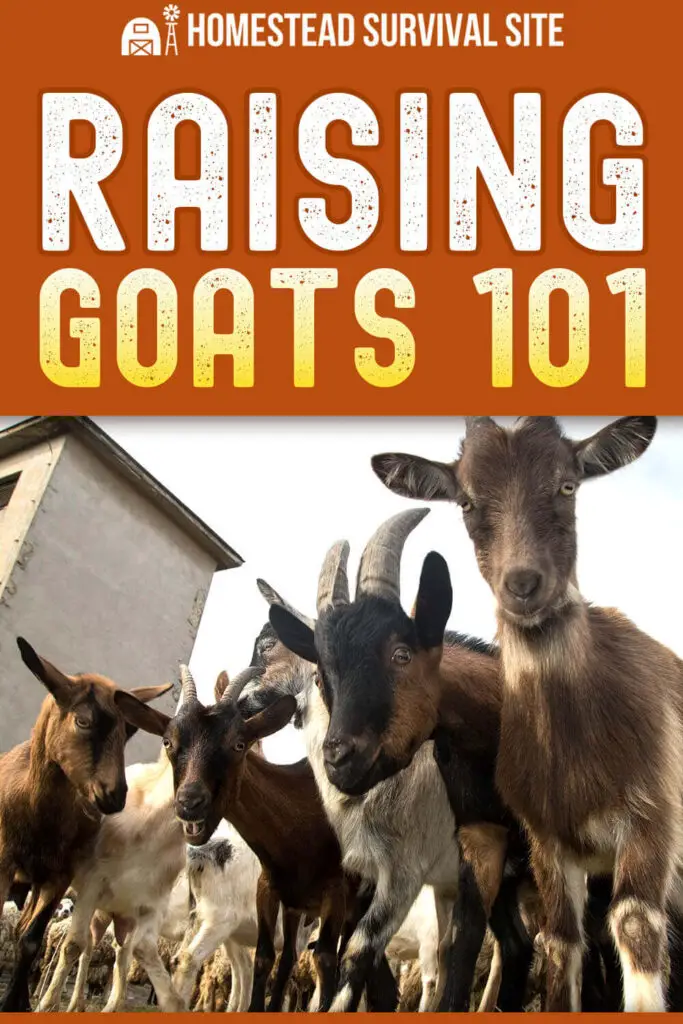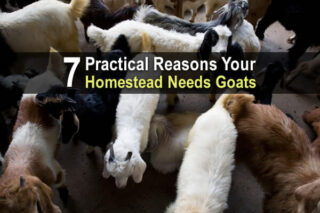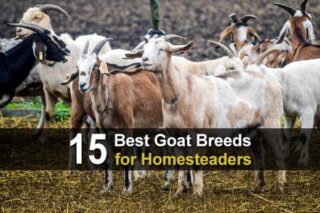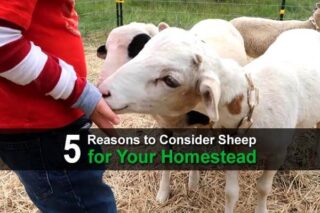Estimated reading time: 8 minutes
As a homesteader, you are always looking for what works best on your land and anything that might add to your lifestyle or augment your goals.
Goats are often an overlooked option, but they will add value to many farmsteads. There are many reasons you may want to consider these ruminants among your livestock.
Want to save this post for later? Click Here to Pin It on Pinterest!
Here are a few of the benefits of raising goats:
- Goats can provide milk on a much smaller scale than a family cow and are smaller and easier to handle.
- Goats can be an excellent source of meat if you are looking to provide for you and yours.
- Goats are phenomenal for brush and weed control and are often used primarily to clear overgrown areas in preparation for making land useful for other purposes.
If you are thinking about raising goats on your homestead, there are a few things you should know. Here are some basics to help you further your success and avoid any mistakes you'll regret.
First of all, you'll want to research the best goat breeds in detail and consider why you want goats on your property. There are many breeds, each with different qualities that will serve different purposes.
Related: 15 Best Goat Breeds for Homesteaders
Goat Breeds
Here we will cover the broad categories of types of goats to help you get started in this journey. There are generally three categories of goats: dairy goats, meat goats, and pygmy goats.
Dairy Goats
Dairy goats are a wide category, but if you are interested in having fresh milk, they are a lovely way to start. You can provide your own milk, depending upon the breed and lactation cycle, up to a gallon a day with a mature milker.
There are many types: Nubian, LaMancha, Alpine, Saanen, Toggenburg and many more. Each breed has different characteristics that are likely to draw you in, with personalities and hardiness unique to each breed.
My personal favorites are Nubian and Alpine goats. Nubians have long floppy ears, a sociable personality, and they are excellent milkers. I fell in love with them when we got our first, but I know many people who rave about the other breeds for many reasons.
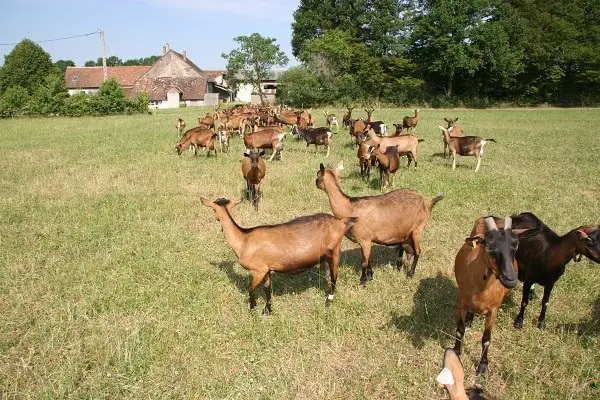
The milk that goats produce is sweeter than cow milk, and the fat globules are smaller which makes it more easily digestible, though difficult to make butter from. Goat milk is reported to be very similar to human milk, and many people who are lactose intolerant are able to comfortably consume goat milk.
When we started our homestead, I chose to get goats for milk rather than a cow for two reasons:
- They produce a reasonable amount of milk that our family can consume, where a cow would produce more than we can consume, even with growing children, making cheese and whatnot.
- I was new to large animals and livestock, and I figured that getting kicked by a cow would be really painful, whereas a kick from a goat would not be disabling.
This may have been simplistic and naive, but it worked for me.
Meat Goats
Meat goats are becoming popular among people who want to provide their own meat on their homestead. A meat goat is a smaller animal than a cow and grows rapidly, so you will likely see a faster availability of meat.
Many breeders cross breed with other types of goats for various reasons, from temperament to size and for a multi-purpose animal. In some cases, you may choose a breed simply because it is what's readily available in your area.
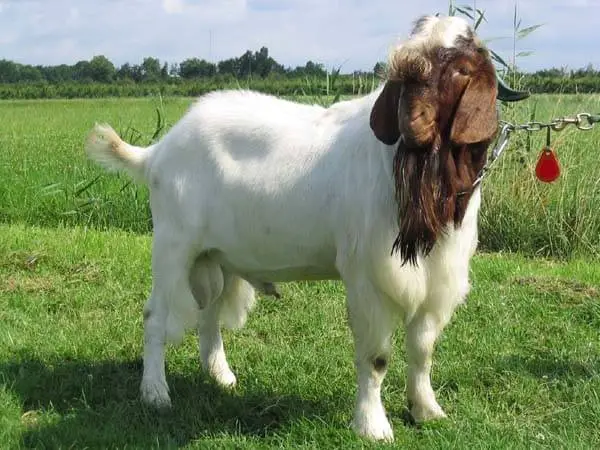
Pygmy Goats
Pygmy goats are common on small homesteads for brush control, pets, and 4H projects. They are not typically used for just dairy or meat, though they can be. These tend to be smaller breeds and easier to handle and interact with.
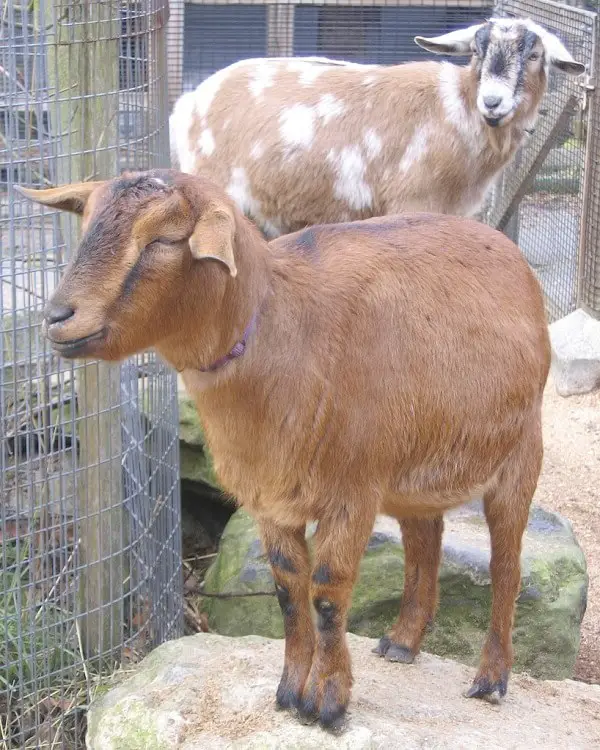
Care and Housing of Goats
Goats are fairly hardy for the most part. Their needs are straightforward: a shelter to get out of the elements, bedding, forage, and grain.
Fencing is a special consideration with goats, as they are well known to be escape artists, so you will want to invest in safe containment, especially if you want to have any landscaping or a garden. Goat fencing needs to be able to withstand a goat leaning on it and stepping on it because they will.
Most goat owners find that it is best to use a standing fence and electric wire to keep the goats contained. Even so, you will want to be on the lookout for any fence breakage that may encourage goat misadventures.
Feed Considerations
Goats are ruminants and eat almost constantly. They love to browse and are known to be excellent for brush control. Many people add goats to their homestead for this very purpose. To learn about pasture considerations in addition to feed, you will want to check out this guide to goat nutrition.
Contact your local ag agency to discuss the pasture qualities that you have available as well as any other recommendations for your particular area. Here in Wisconsin, my goats were fabulous for eating all the burdocks that plagued my horse pastures, and even the thistles!
It is very important to watch the feed ingredients carefully. While sheep and goats seem similar, the copper in sheep feed is deadly for goats. Check the ingredients in any mineral blocks and feeds that you provide. Your goats will thrive on a well-balanced diet.
One thing that must be remembered about ruminants is that they are unable to belch, so they are susceptible to “bloat”. This is a life-threatening illness in which the goat gets gas trapped in the rumen and is unable to relieve the pressure. Basically, your goat has a tummy ache, likely from eating a wet lush grass such as alfalfa and it is unable to release the pressure. Your vet can instruct you on treatments that you can administer at the first signs of a problem.
Goats are also susceptible to parasites, so a regular worming program under the direction of your veterinarian is a must.
Related: Protect Your Livestock from Deadly Diseases
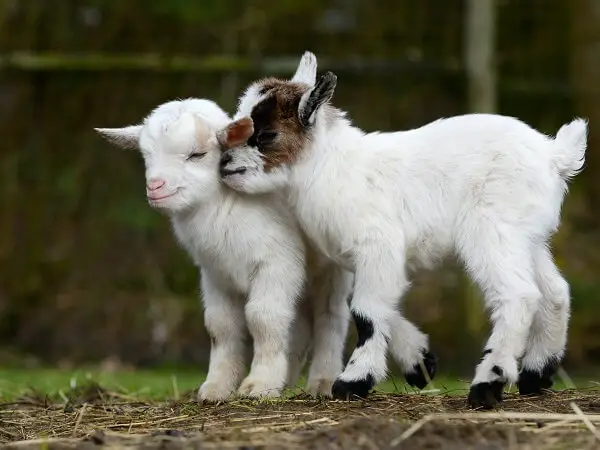
Goat Breeding and Kidding
One of the joys of having your own goats is baby goats! They have an energy and vitality that will make you laugh and keep you entertained.
Goats breed easily, coming into heat seasonally and are pregnant for about five months. Some folks keep their own buck for breeding, and others choose to “rent” one or use artificial insemination. Here is a guide to breeding goats you should check out.
The breeding cycle is fairly predictable once you know what you are looking for. With preparations and careful observation, you will be able to judge the signs of impending kidding. Some people prefer to breed their does carefully so they know exactly when they are likely to kid.
Most goats do not need assistance during birth, but goat breeders are very familiar with helping to turn or pull a baby during birth. Our vet guided me through our first assisted birth over the phone during a snowstorm, and the triplets all did very well. It is truly an astounding experience to watch the little ones wobble to their feet and take their first few steps. We rarely had a mama goat reject her babies, even first-time moms. Most goats are exceptional mothers.
So, goat type and purpose, housing and containment, feed and nutrition, and birthing are the main components you want to consider as you prepare for your goats. As you walk this journey with your goats, you will learn a lot and want to research more in-depth on many topics. One step at a time and you can build an enjoyable goat herd for whatever your purposes are.
Like this post? Don't forget to Pin It on Pinterest!



